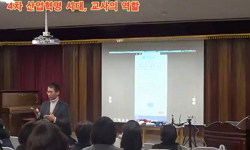교통수단 및 교통시설 이용에 대한 상위 근거법령 및 제도적 근거를 토대로 교통복지 개념 정립이 필요한 상황이다. 주로 정책적 측면에서 보편적 용어로 사용되고 있을 뿐 명확한 기준이 ...
http://chineseinput.net/에서 pinyin(병음)방식으로 중국어를 변환할 수 있습니다.
변환된 중국어를 복사하여 사용하시면 됩니다.
- 中文 을 입력하시려면 zhongwen을 입력하시고 space를누르시면됩니다.
- 北京 을 입력하시려면 beijing을 입력하시고 space를 누르시면 됩니다.

4차 산업혁명과 교통복지의 연계성에 따른 구축방향 - 교통복지 운영시스템을 중심으로 - = The Construction Direction based on the 4th Industrial Revolution and Transportation Welfare - Focusing on the Transportation Welfare Operation System -
한글로보기https://www.riss.kr/link?id=A109446574
- 저자
- 발행기관
- 학술지명
- 권호사항
-
발행연도
2024
-
작성언어
Korean
- 주제어
-
등재정보
KCI등재
-
자료형태
학술저널
-
수록면
97-104(8쪽)
- 제공처
-
0
상세조회 -
0
다운로드
부가정보
국문 초록 (Abstract)
교통수단 및 교통시설 이용에 대한 상위 근거법령 및 제도적 근거를 토대로 교통복지 개념 정립이 필요한 상황이다. 주로 정책적 측면에서 보편적 용어로 사용되고 있을 뿐 명확한 기준이 없기 때문에, 본 연구는 4차 산업혁명 시대에 요구되는 교통복지 운영시스템을 구축함에 있어 요구되는 관련 지표를 통한 개념의 확산 및 구축방향과 시사점을 도출하는 데 목적을 두고 있다. 연구의 방법은 문헌조사 및 주요 이론적 고찰의 비교・분석을 통해 접근하였다. 연구 결과, 4차 산업혁명과 교통복지에 대한 미래 교통복지 운영시스템을 구축하는 데는, 교통복지의 외연적 확대 필요성, 교통복지의 선제적 정책 대비, 교통복지의 전달시스템의 적극적 활용 등을 새로운 미래의 교통복지 운영시스템을 창출하는 구축방향으로 파악하였다. 연구 한계점으로는 계량적이고 정량적인 연구방법을 통해 분석에 접근해야 하나 자료취득의 어려움, 여건분석을 통한 통계적인 기술적 한계로 나타났다. 향후 관련 연속된 연구에서 보완하기로 한다.
다국어 초록 (Multilingual Abstract)
It is necessary to establish the concept of transportation welfare based on the higher-based laws and institutional grounds for the use of transportation and transportation facilities. Since it is mainly used in universal terms in terms of policy and ...
It is necessary to establish the concept of transportation welfare based on the higher-based laws and institutional grounds for the use of transportation and transportation facilities. Since it is mainly used in universal terms in terms of policy and there is no clear standard, this study aims to derive the direction and implications of the spread of concepts and construction through related indicators required in establishing the transportation welfare operation system required in the era of the 4th industrial revolution. The method of the study was approached through comparison and analysis of literature surveys and major theoretical considerations. As a result of the study, in order to establish a future transportation welfare operation system for the 4th industrial revolution and transportation welfare, the necessity of outward expansion of transportation welfare, preparation for the preemptive policy of transportation welfare, and active use of the transportation welfare delivery system were identified as the construction direction to create a new future transportation welfare operation system. As for the limitations of the study, it was necessary to approach the analysis through quantitative and quantitative research methods, but it was found to be difficult to acquire data and statistical and technical limitations through condition analysis. It will be supplemented in future related continuous studies.
동일학술지(권/호) 다른 논문
-
- 대한산업경영학회
- 박혜영
- 2024
- KCI등재
-
스마트 홈 환경에서 분산원장 기술을 활용한 키 관리 프로토콜 설계
- 대한산업경영학회
- 박중오
- 2024
- KCI등재
-
- 대한산업경영학회
- 서영선
- 2024
- KCI등재
-
서비스접점에서 인간종업원과 셀프서비스기술간 고객경험의 차이에 관한 연구
- 대한산업경영학회
- 김상희
- 2024
- KCI등재
분석정보
연관 공개강의(KOCW)
-

4차 산업혁명 시대, 미래교육은 어떻게 준비하고 있고 어디로 가고 있는가?
한국교육학술정보원 Thomas Ryan(북미학교 네트워크 컨소시),Adrian Lim(싱가포르 정보통신국) -

4차 산업혁명 시대, 새로운 테크놀로지의 교육적 활용
한국교육학술정보원 최재화(조지 워싱턴 대학), Aaron Hor(Midwestern Higher Education Compact), Sung Hong(유데미) -

4차 산업혁명 시대 초연결을 위한 유무선 통신 기술
금오공과대학교 김선명 -

4차 산업혁명 시대, 대학교육의 혁신방안
신한대학교 신종우 -

4차 산업혁명 시대, 교사의 역할(민락초등학교)
신한대학교 신종우




 KCI
KCI eArticle
eArticle

